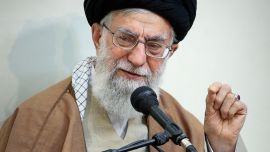Breaking his silence over nationwide protests that have included calls for his ouster, Iran's supreme leader on Tuesday blamed the demonstrations on "enemies of Iran," saying they were meddling in its internal affairs.
The remarks by Ayatollah Ali Khamenei on the demonstrations – the largest seen in Iran since its disputed 2009 presidential election – came after a bloody night that saw protesters try to storm a police station and the first deaths among its security forces. The unrest has killed at least 21 people in the past six days.
The protests began December 28 in Mashhad over the weak economy and a jump in food prices. They have since expanded to cities and towns in nearly every province. Hundreds have been arrested, and a prominent judge warned that some could face the death penalty.
Speaking to black-chador-clad women who were relatives of veterans and war dead, the 78-year-old Khamenei warned of an enemy "waiting for an opportunity, for a crack through which it can infiltrate."
"Look at the recent days' incidents," he said. "All those who are at odds with the Islamic Republic have utilised various means, including money, weapons, politics and (the) intelligence apparatus, to create problems for the Islamic system, the Islamic Republic and the Islamic Revolution."
Khamenei avoided identifying any foreign countries, although he promised to elaborate in the coming days. Undoubtedly high on his list is the United States, where President Donald Trump has tweeted his support for the protests for several days.
On Tuesday, he wrote that "the people of Iran are finally acting against the brutal and corrupt Iranian regime."
"All of the money that President [Barack] Obama so foolishly gave them went into terrorism and into their 'pockets,'" Trump wrote, apparently referring to the nuclear deal reached under his predecessor. "The people have little food, big inflation and no human rights. The US is watching!"
It is unclear what effect Trump's tweets are having on the protests. Iran's state TV reported on his tweets in its news broadcasts, and some people have shared them online, but many in Iran distrust him because he has refused to re-certify the 2015 nuclear deal and his travel bans have blocked Iranians from getting US visas.
Iran's Foreign Ministry spokesman Bahram Ghasemi urged Trump to stop tweeting and focus on his own country's problems.
"It is better for him to try to address the United States’ internal issues like the murder of scores killed on a daily basis in the United States during armed clashes and shootings, as well as millions of the homeless and hungry people in the country," Ghasemi said, according to the state-run IRNA news agency.
Even reformists, who backed the last major protest movement in 2009, condemned the unrest and the support it has received from the United States. But they also urged the authorities to address economic grievances that have fuelled the protests.
"The Iranian people are confronted with difficulties in their daily lives... and have the right to peacefully demand and protest," said a statement from the Association of Combattant Clerics, headed by reformist ex-president Mohammad Khatami.
Domestic unrest
Khamenei, who has final say over all state matters, has blamed foreign adversaries for domestic unrest in the past. In 2009, as Green Movement demonstrations rattled his government, he said the post-election unrest was calculated by Iran's enemies "whether or not its leaders know."
But that's not to say Iran doesn't face foreign adversaries. Gulf Arab nations have been watching the protests carefully, with Saudi-funded satellite channels in particular playing up the unrest. Israeli Prime Minister Benjamin Netanyahu, long a foe, has praised the protesters.
The protests began over the economy, which has improved since the nuclear deal that saw Iran agree to limit its enrichment of uranium in exchange for the end of some international sanctions. Tehran now sells its oil on the global market and has signed deals to purchase tens of billions of dollars' worth of Western aircraft.
That improvement has not reached the average Iranian, however. Unemployment remains high, and official inflation has crept up to 10 percent again. A recent increase in egg and poultry prices by as much as 40 percent, which the government has blamed on a cull over avian flu fears, appears to have sparked the protests.
Analysts suggest the protests starting in Mashhad mean conservatives pushed them forward as a way to challenge President Hassan Rouhani, a relatively moderate cleric whose administration struck the nuclear deal. The apparently leaderless protests, fanned in part by a messaging app called Telegram, then grew beyond their control to include violent confrontations, analysts say.
The government has since shut down access to Telegram and the photo-sharing app Instagram, which now join Facebook and Twitter in being banned.
The Trump administration called on Iran's government to stop blocking Instagram and other popular social media sites. US Undersecretary of State Steve Goldstein said Instagram, Telegram and other platforms are "legitimate avenues for communication."
Early Tuesday, state TV reported rioters tried to break into a police station in the town of Qahdarijan to steal guns, leading to clashes that killed six people. Two more were killed in the town of Khomeinishahr, while a member of Iran's paramilitary Revolutionary Guard and a police officer were killed in the town of Najafabad, according to local media.
The towns are all in the central province of Isfahan, about 350 kilometres (215 miles) south of Tehran.
Rouhani and others have warned that the government wouldn't hesitate to crack down on those it considers lawbreakers. None of the protest rallies so far have received permission from the Interior Ministry, making them illegal.
In Tehran alone, 450 protesters have been arrested in the last three days, the semi-official ILNA news agency reported Tuesday. ILNA quoted Ali Asghar Nasserbakht, a deputy governor of Tehran, as saying security forces arrested 200 protesters on Saturday, 150 on Sunday and 100 on Monday. So far, authorities have not released a nationwide figure for arrests.
The head of Tehran's Revolutionary Court also reportedly warned that arrested protesters could potentially face the death penalty when they are put on trial.
"Obviously one of their charges can be Moharebeh," or waging war against God, Iran's semi-official Tasnim news agency quoted Mousa Ghazanfarabadi as saying. Moharebeh is punishable by death in Iran.
-TIMES/AFP/AP

























Comments